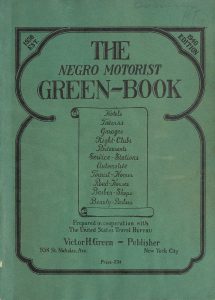Cohesive Vignettes (Green Book)
There are two types of films which are essentially a series of vignettes: road movies and biography pictures. Each often suffers from trying to stuff unrelated elements into a single package. Green Book is both a road movie and a biography that tells a single, cohesive story of unlikely friendship amidst societal injustice. It is a worthy and entertaining film that remains enjoyable even where the events are hard to stomach.
Green Book is the “based on real events” story of a black musician (Dr. Don Shirley played by Mahershala Ali) touring the Deep South in the early 1960s. For his safety, he is accompanied by an Italian driver (“Tony Lip” Vallelonga played by Viggo Mortensen) who could be well described in stereotypical terms — he’s essentially a thug.
 The movie derives its title from “The Negro Motorist Green Book” — a travel guide listing “friendly” businesses and advisories about local hazards (racist laws) to help keep African Americans “from running into difficulties” while travelling in the United States. The 1962 edition factors into the film, though it does little good for the New York based pair as they encounter the morally repugnant conditions pervasive throughout the South. With its 130 minutes of run time, this film could have gone a lot of directions. It leverages the format of its genres to strike a balance that engages the audience and holds them in a personal and relatable way.
The movie derives its title from “The Negro Motorist Green Book” — a travel guide listing “friendly” businesses and advisories about local hazards (racist laws) to help keep African Americans “from running into difficulties” while travelling in the United States. The 1962 edition factors into the film, though it does little good for the New York based pair as they encounter the morally repugnant conditions pervasive throughout the South. With its 130 minutes of run time, this film could have gone a lot of directions. It leverages the format of its genres to strike a balance that engages the audience and holds them in a personal and relatable way.
In the standard “hero’s journey” style, the main character grows and is redeemed as a result of his trials. In Green Book we have a pair of heroes, and both change as a result of their travel and, more so, influence of the other. Dr. Shirley begins as an overly refined gentleman accustomed to — even demanding — the reverence he is given living in and above Carnegie Hall. His last performance of the film is playing hustling rhythm and blues style in a chicken-joint — truly enjoying himself. In an opening scene, Tony Lip throws away two glasses in his own home because his wife allowed two black workmen to sip lemonade from them. Naturally, taking the job Driving Miss Daisy — er, Dr. Shirley — reverses his opinions.
The principal actors’ performances ring true, but special mention should go to Linda Cardellini, playing Tony Lip’s wife. Though she is at odds with her husband, over pretty much every story point, she remains devoted to him. The actress manages to convey this dissonance without the crutch of some confrontational monologue. Instead, she demands only that he write her letters while he’s away with the “music doctor” for two months.
It would be easy to write about this story like some “woke hipster” babbling on about how these men encountered only a small part of the daily life for millions of Americans, or ramble about Oscar consideration in a more inclusive Hollywood, such talk would do the movie itself disservice. Though it makes limited use of the grandness of the theatre screen, Green Book deserves to be seen in the theatre.